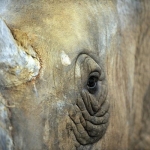A 'yellow' explosion in Paris
The "yellow vest" protests in Paris last weekend seemed to take everyone by surprise by their violence and spontaneity, not the least the phographers covering them.
The violence seemed to explode everywhere and at once, write Alain Jocard, Geoffroy Van der Hasselt and Lucas Barioulet.
Alain Jocard
The violence erupted all of a sudden and it seemed to be everywhere at once. That’s what marked the yellow vests protests from other major demonstrations that I’ve covered before in Paris. In the others, there seemed to be a script followed by everyone. Not here. Like the movement itself, the violence seemed to just spring up out of nowhere.
I saw people of all ages. Many of them weren’t wearing masks. I think they came to demonstrate and got caught up in the violence. There were also the “casseurs” -- literally someone who breaks things, loosely translated as thugs, these are the people who attach themselves to any large demonstration in Paris with the intent of causing as much damage as possible. They were easily identifiable and more organized. What struck me was that this time, they had established a series of barricades. They didn’t wait to lose one to police before making another one. This time when they lost one, they just fell back to another they had already built. This slowed down the police, giving the “casseurs” a chance to re-organize and go wreak havoc someplace else. The barricades were often manned not by the “casseurs” but by regular protesters. They were the ones who were most affected by the tear gas and who seemed to be throwing anything they could find at the police.
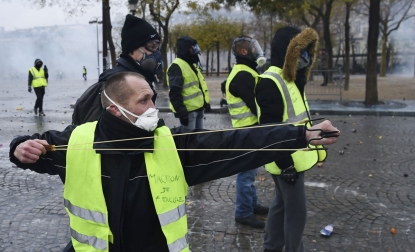 Place de l'Etoile, December 1, 2018.
(AFP / Lucas Barioulet)
Place de l'Etoile, December 1, 2018.
(AFP / Lucas Barioulet)I didn’t have any problems working, except for one incident, when a group set on me after I took a picture of them getting ready to set fire to something. They started after me, but then got distracted by something else, so I made a run for it.
I don’t think I’ve ever had to cover so much ground during a demonstration. In previous ones, there was a group of around 600 “casseurs” who would attack police en masse and then regroup before their next strike. Here, there was no regrouping, they just seemed to be everywhere. This made my job more difficult -- as a photographer, you’re constantly thinking of how to get “symbolic” photos, the ones that tell the story of the entire demonstration. And here, I had to constantly go cover the latest clash. There wasn’t too much time for reflection.
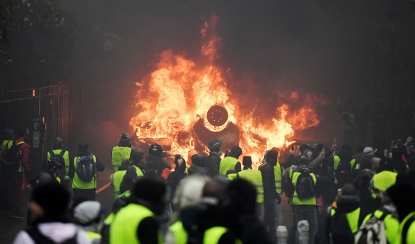 Paris, December 1, 2018.
(AFP / Alain Jocard)
Paris, December 1, 2018.
(AFP / Alain Jocard)I did manage to get some good ones -- the one of the policeman covered in yellow paint, same color as that of the protesters. Or that of the firefighter on a street lined with burning cars. I think those photos summed up the situation quite nicely.
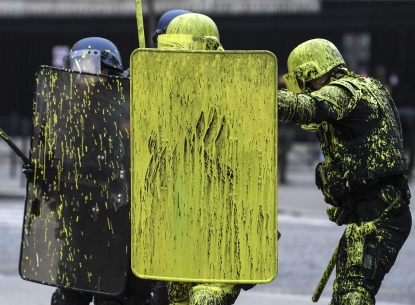 Paris, December 1, 2018. (AFP / Alain Jocard)
Paris, December 1, 2018. (AFP / Alain Jocard)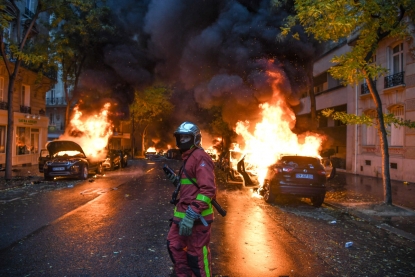 Paris, December 1, 2018. (AFP / Alain Jocard)
Paris, December 1, 2018. (AFP / Alain Jocard)Geoffroy Van der Hasselt
The other photographers and I decided to meet at AFP headquarters at 8 am. We thought we’d have plenty of time to just mosey on down to cover the demonstrations, which weren’t due to begin until 2 pm. And then at 8:30 we got word of the first arrests. Our leisurely stroll turned into a dash.
I was assigned to cover the lower part of the Champs Elysees. My first photos were of families strolling around, of joggers. A stark contrast to the clashes taking place up higher, near the Arc de Triomphe.
Around noon, I went closer to the Arc de Triomphe. There were groups of yellow vest protests on the side streets and a large peaceful contingent in the middle of the avenue. There was no shortage of stun grenades or tear gas.
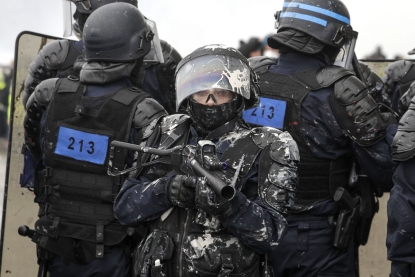 Paris, December 1, 2018. (AFP / Geoffroy Van Der Hasselt)
Paris, December 1, 2018. (AFP / Geoffroy Van Der Hasselt)I’ve covered plenty of demonstrations in Paris and elsewhere and what struck me was the amplitude and the length of this one. Usually in demonstrations, the violence is concentrated in one spot. Here, it seemed to go off everywhere. This looks like a revolution, I told myself.
A lot of the protesters whom I saw weren’t scared at all. They didn’t look like the “casseurs,” they weren’t masked, many just had a scarf against the tear gas.
I saw people actively causing as much damage as possible and others trying to calm things down. On Victor Hugo Avenue, three guys were attacking cars with diplomatic plates and then Smarts, since these were easy to roll over. They asked other protesters to help them and the others obliged. I also saw a group talk others out of setting fire to Christmas trees at a florist, arguing that this could set the whole building on fire.
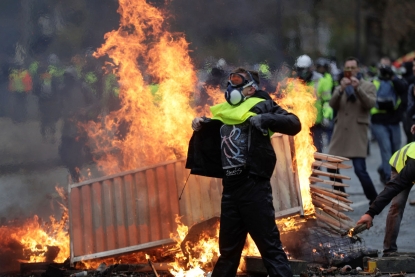 Paris, December 1, 2018. (AFP / Geoffroy Van Der Hasselt)
Paris, December 1, 2018. (AFP / Geoffroy Van Der Hasselt)I was struck by how many people weren’t masked. Like one guy setting cars on fire. It seemed idiotic to me to do something like that without a mask.
At one point, I sat at a bus stop, its glass shattered, to send some photos. A guy with a pink scooter stopped by, just to chat. I showed him a photo that I had taken of him earlier. He didn’t recognize himself.
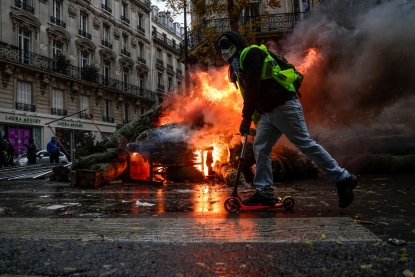 Paris, December 1, 2018.
(AFP / Geoffroy Van Der Hasselt)
Paris, December 1, 2018.
(AFP / Geoffroy Van Der Hasselt)Lucas Barioulet
When I saw that the first tear gas volleys came around 9 am, I knew it was going to be a long day.
During demonstrations, I prefer to work among the protesters. I get a better sense of them that way. Plus, you reason that the worst that you can get is a flash ball. Whereas if you work on the side of the police, you’re bound to be hit with whatever is launched at you.
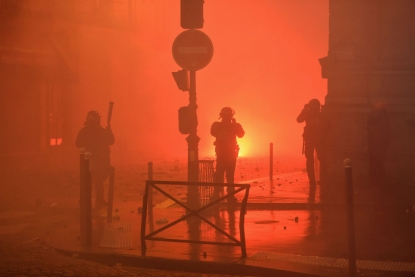 Paris, December 1, 2018. (AFP / Lucas Barioulet)
Paris, December 1, 2018. (AFP / Lucas Barioulet)At night, I found myself on the police side. The demonstrators were hidden by walls of tear gas, throwing cobblestones and anything else they could find at them. I saw the riot police put one of their colleagues who had been hit to the side. Then another. They took off their helmets and I saw their exhausted and stunned faces.
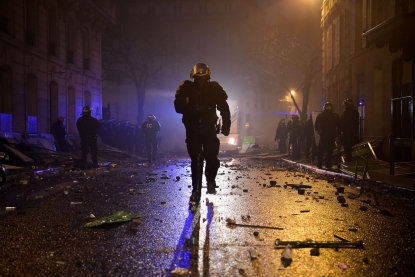 Paris, December 1, 2018. (AFP / Lucas Barioulet)
Paris, December 1, 2018. (AFP / Lucas Barioulet)From what I saw, most of the demonstrators were average people, workers, fathers. They got caught up in the violence, but the professional troublemakers, the “casseurs,” usually young men in their 20s, they don’t get caught.
Sometimes I felt hostility from the demonstrators, but it never came to violence. Some asked me not to take photos of them in action, so that they wouldn’t be arrested later. Others were very nice. At one point, I found myself at a barricade, having a bite with some of them, me with my energy bars, they with their sandwiches and beer. We talked about everything but the demonstration itself.
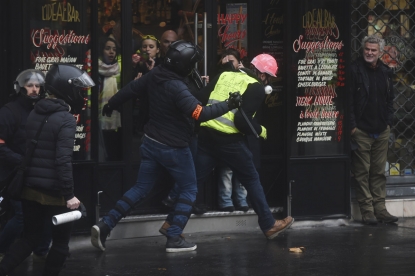 Paris, December 1, 2018. (AFP / Lucas Barioulet)
Paris, December 1, 2018. (AFP / Lucas Barioulet)The noise was constant. It’s something difficult to get across, even in video. For eight hours, you had the whistles of tear gas, the thumps of the flashballs, the explosions of stun grenades, the yelling. The moments before the two sides come into direct contact are the most surprising -- they’re almost silent, like the calm before the storm. And then it all goes off.
The disorganization of this protest made it difficult to cover. Unlike with others, there was no established “frontline,” it was happening everywhere at once. At one point, I climbed a ladder at a construction site to get a view from the top. Ten minutes after I climbed down, it was in flames.
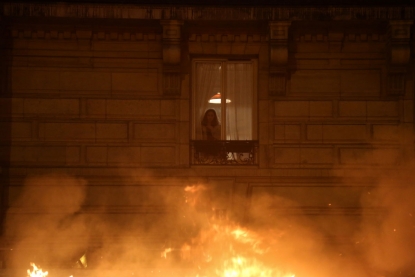 Paris, December1, 2018. (AFP / Zakaria Abdelkafi)
Paris, December1, 2018. (AFP / Zakaria Abdelkafi)This blog was written with Pierre Celerier and translated by Yana Dlugy in Paris.


